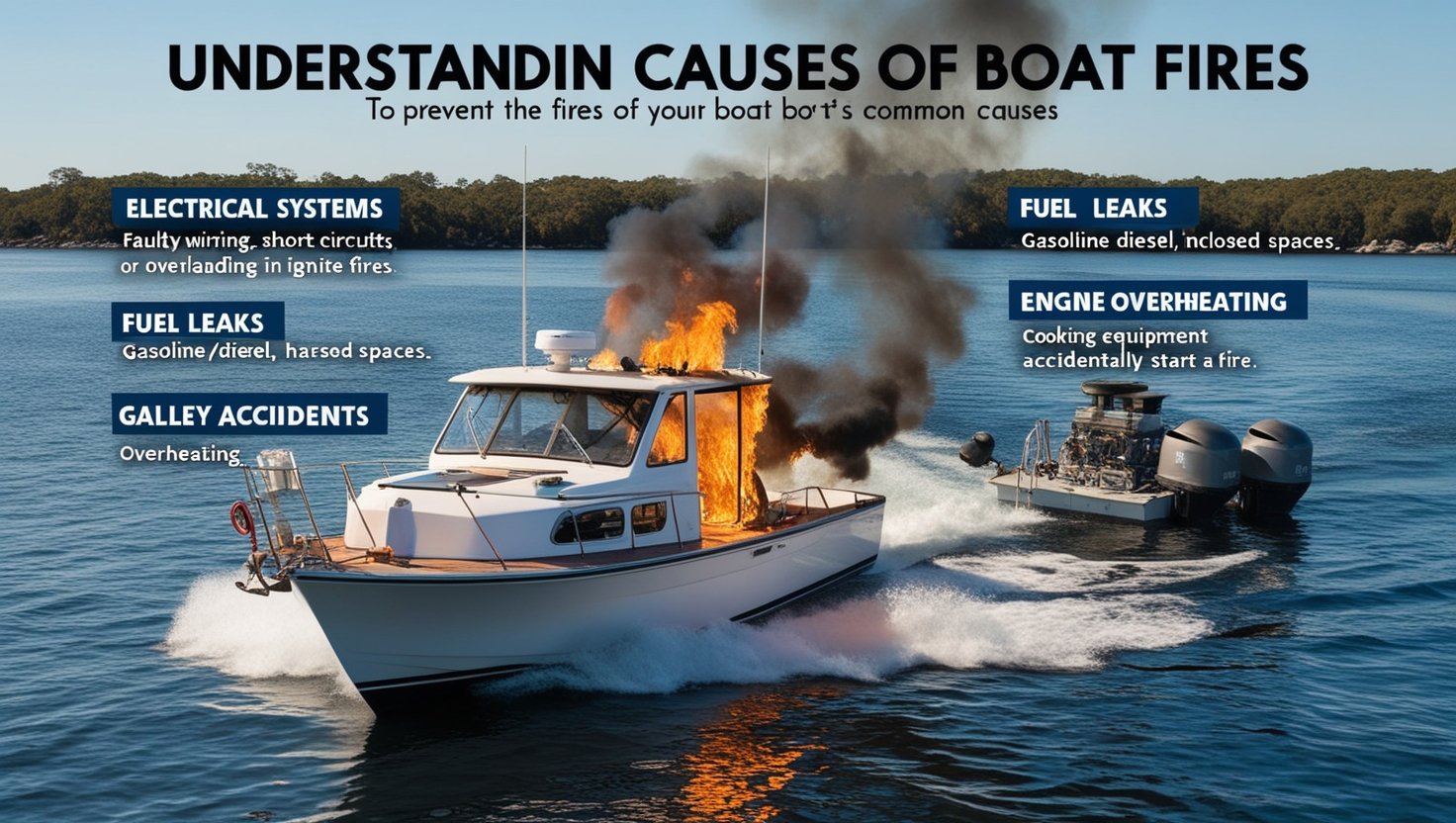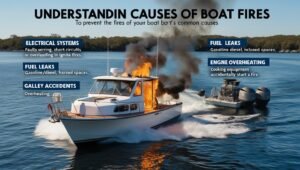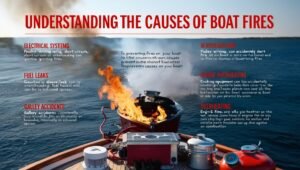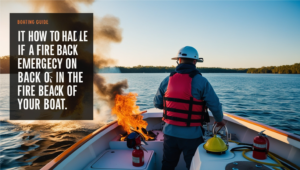
What should you do if the back of your boat catches fire?
Sailing is a wonderful activity that offers freedom, adventure, and a close connection with nature. However, like any other outdoor activity, it comes with its risks, including the potential for fire. Knowing how to deal with a fire emergency on your boat is vital to the safety of everyone on board. This guide will walk you through the steps you need to take if the back of your boat catches fire, ensuring you are prepared to handle this difficult situation effectively.

Understanding the Causes of Boat Fires
To prevent fires in your boat, it’s important to understand their most common causes:
Electrical Systems Bad wiring, short circuits, or overloading can ignite a fire.
Fuel Leaks Gasoline or diesel leaks can be dangerous, especially in confined spaces.
Wet Accidents Cooking equipment can catch fire accidentally.
Engine Overheating Overheating can cause combustion.
Being aware of these hazards helps you take precautions to reduce fire hazards on your boat.
IMMEDIATE MEASURES IN CASE OF FIRE
If you find yourself on fire in your boat, follow these quick steps:
1KEEP CALM Panic can escalate the situation. Keep a clear head to make rational decisions.
2 WARNING EVERYONE ON BOARDM Make sure everyone is aware of the fire so they can take appropriate action.
3 Shut off the engine Shut off the engine to reduce the risk of a fuel or oil fire.
4 STOP FUEL SUPPLY If it is safe to do so, cut off the fuel supply to prevent the fire from spreading.
5 Use a fire extinguisher install a suitable fire extinguisher and aim at the base of the fire. Remember the abbreviation for PASS:
Pull the pin.
AIM is based on fire.
Squeeze the handle.
Sweep the nozzle from side to side.
6 Call for help Use your VHF radio or mobile phone to call the Coast Guard or other emergency services
7 Evacuate if necessary Prepare to evacuate the boat using life jackets and life rafts if the fire is out of control.

Effective use of fire extinguishers
Not all fires are the same, and different types of fires require different fire extinguishers. It is important to know how to use your fire extinguisher properly:
Class A Extinguishers For fires involving solid combustibles such as wood or paper.
Class B Extinguishers For fires involving flammable liquids such as gasoline.
Class C Extinguishers For fires involving electrical appliances.
Make sure you have adequate fire extinguishers on board and that they are easily accessible.
Precautions to reduce fire hazard
Preventing a fire is always better than fighting it. Here are some steps you can take to reduce fire hazards:
Regular Maintenance Make sure your boat’s electrical and fuel systems are inspected regularly.
Proper Storage Store flammable materials in safe, well-ventilated areas.
Wet Safety Install smoke detectors and fire blankets in the kitchen area.
Engine Room Safety Keep the engine room clean and free of oil or fuel spills.
Training and Drills Conduct regular fire safety drills with your staff or family to ensure everyone knows what to do in an emergency.
What to do after the fire is under control?
After the fire is under control, take the following steps:
1 Inspect the damage Carefully assess the extent of the damage and make sure it is safe to stay on the boat.
Contact Authorities Report the incident to the relevant maritime authorities for further assistance.
3 File an Insurance Claim Notify your insurance company about the fire to start the claims process.
4 Repairs and Renovations Depending on the damage, you may need to repair or overhaul your boat to make it seaworthy again.
result
Fires in boats are a serious hazard that can lead to catastrophic consequences. However, by understanding the causes, knowing how to react quickly, and implementing precautions, you can significantly reduce the risk of your boat catching fire. Be alert, maintain your boat well, and always be ready to act quickly in the event of a fire. Remember, the safety of you and your passengers is paramount.

1 What is the first action to take when a fire breaks out on a boat?
The first action to take is to remain calm and quickly alert everyone on board. Panic can lead to poor decision-making and accidents. Clear communication and quick thinking are crucial in handling the situation efficiently and safely.
2 How can you prevent fuel-related fires on your boat?
Prevent fuel-related fires by regularly inspecting your boat’s fuel system for leaks and maintaining it in good condition. Ensure that all fuel lines are secure and replace any that show signs of wear. It’s also important to refuel in well-ventilated areas and clean up any spills immediately.
3 What type of fire extinguisher is best suited for a boat fire?
A Class B fire extinguisher is best suited for boat fires, as it is designed to tackle flammable liquids such as gasoline and oil, which are common on boats. However, having a multi-purpose extinguisher that covers Class A (solid combustibles) and Class C (electrical fires) is also beneficial
4 Why is it important to conduct regular fire drills on your boat?
Conducting regular fire drills is important because it helps familiarize everyone on board with emergency procedures and the location of safety equipment. Practicing drills ensures that everyone knows how to respond quickly and efficiently in case of a real fire, which can significantly reduce the risk of injury or loss of life.
5 What should you do if a fire on your boat cannot be controlled?
If a fire on your boat cannot be controlled, it is essential to evacuate the boat as safely and quickly as possible. Ensure that all passengers are wearing life jackets and use a lifeboat or life raft if available. Once in the water, move a safe distance away from the boat to avoid potential explosions and call for help using a VHF radio or mobile phone.
Sail boating is an amazing pastime that provides independence, excitement, and a strong bond with the natural world. It does have some risks, though, like any other outdoor activity, including the possibility of fire. For the sake of everyone on board, you must know how to handle a fire emergency on your boat. This guide will make sure you are ready to deal with this challenging situation by taking you step-by-step through what to do if the back of your boat catches fire.
https://tani1.com/wp-admin/post.php?post=994&action=edit
https://tani1.com/contact/
